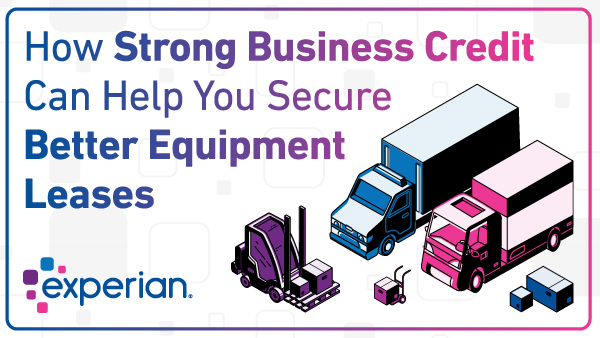Small Business Matters is written and managed by the Experian Small Business team. Subscribe for business credit education, expert advice, and helpful articles to build a strong knowledge of business credit so you can scale and grow your business.
Business Credit Reports & Scores

Your business has a credit score too and it can be pivotal to your success. Learn more about building strong business credit.
Read moreCustomer Testimonials

Hear what Experian small business customers have to say about our credit report subscriptions; and the difference it makes.
View TestimonialsNews & Research

Stay ahead of the curve by being informed about industry trends and policies that impact small businesses.
Read moreThe latest from our experts
When the financial risks are high, business credit monitoring is helping this San Jose, California construction firm minimize risk. In the construction industry, financial risk is a constant reality. Large contract values, long project timelines, supply chain volatility, and bonding requirements all put pressure on a company’s financial health. For Teamwrkx Construction, Inc., a multi-state commercial general contractor based in San Jose, California, staying ahead of those risks requires clear visibility into its business credit profile. With more than 20 years in operation and annual project volumes ranging from $20 million to $50 million, Teamwrkx relies on Experian Business Credit Advantage to monitor its credit, verify accuracy, and help protect the company from fraud. Managing Complexity with Reliable Business Credit Monitoring What began as a business incubator has grown into a complex organization with multiple entities spanning construction, facilities development, nonprofit initiatives, education, and international operations. This level of complexity increases the importance of accurate and timely credit reporting. Teamwrkx conducts internal financial reviews every 30 days and works with nationally recognized accounting firms on a quarterly basis. Alongside these efforts, Experian Business Credit Advantage provides an additional layer of oversight, giving leadership confidence that the credit information being reported to lenders, banks, and partners reflects the true financial position of the business. Accurate business credit data is essential not just for internal decision-making, but also for maintaining strong relationships with financial institutions. Business Credit Monitoring as a Defense Against Fraud Fraud is not limited to small or new businesses. Even established construction firms can become targets, and when fraud goes undetected, the consequences can be severe, ranging from disrupted cash flow to damaged lender trust. Teamwrkx has experienced multiple fraud events over the years. According to CEO and CFO Eric Venzon, Experian has played a key role in identifying suspicious activity early. By flagging potential concerns, Experian Business Credit Advantage has helped Teamwrkx address issues quickly and correct inaccuracies before they created larger operational problems. Once a potential issue is identified, Teamwrkx works closely with its banking partners to resolve it, reducing the risk of long-term financial or reputational harm. Early detection allows the business to stay focused on projects rather than reacting to preventable setbacks. How Business Credit Monitoring Supports Credit, Bonding and Financing For construction companies, business credit health directly affects bonding eligibility, financing options, and the ability to pursue larger projects. Teamwrkx maintains multiple unencumbered lines of credit and keeps balances at zero, but access alone isn’t enough. Lenders and sureties need visibility into creditworthiness. Experian business credit reports provide that visibility. They give lending institutions another way to assess Teamwrkx’s financial stability, reinforcing trust and supporting ongoing access to capital when it becomes strategically advantageous; such as pre-purchasing materials to manage cost increases or supply chain delays. As project sizes grow and timelines stretch over months or years, having strong, well-documented business credit helps ensure the company is ready to act when opportunities arise. Confidence Starts with Knowing Where You Stand For Teamwrkx Construction, business credit monitoring is not about reacting to problems; it’s about staying prepared. Experian Business Credit Advantage supports that approach by helping ensure credit accuracy, detecting fraud early, and reinforcing confidence with banks and bonding partners. In an industry where the financial stakes are high, proactive credit monitoring enables construction businesses to protect their operations, strengthen lender relationships, and position themselves for sustainable growth. About Experian Business Credit Advantage Experian Business Credit Advantage is a self-monitoring tool that helps small businesses stay on top of their credit profile, identify risks, and position themselves for better financing opportunities. By providing ongoing visibility into a company’s financial reputation, Experian helps business owners like Jessica Orcsik focus on what matters most: building, growing, and achieving long-term success. Learn More About Business Credit Advantage
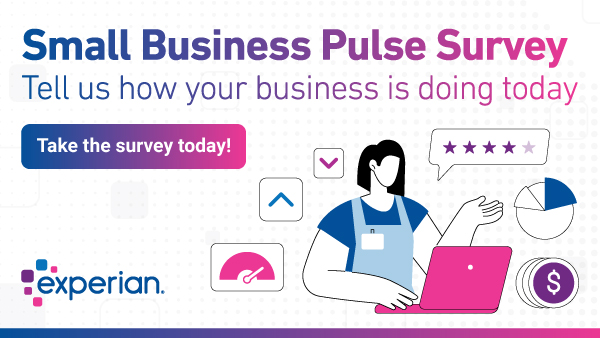
At Experian, we believe every small business has a story—and your story matters. That’s why we’re excited to launch the Experian Small Business Pulse Survey, a quick, credit-focused monthly check-in that amplifies your voice and helps shape the future of small business lending. Please Submit Your Survey by 11/15/2025 Each month, we invite a special cohort of small business owners to share insights and experiences. This feedback helps Experian to better understand what’s driving confidence, what challenges are emerging, and how we—and our partners in lending, insurance, and trade—can better support small business growth. Why Participate? By joining the Pulse Survey, you’ll: View peer insights — See how other businesses are navigating similar challenges and opportunities. Shape the big picture — Your responses help inform lenders and policymakers who play a role in the small business ecosystem. Amplify your influence — Be part of the conversation that impacts access to credit and financial opportunities for businesses like yours. The survey takes just a few minutes to complete each month—but its impact is far-reaching. Together, we can ensure small business voices are heard loud and clear. Ready to make a difference? Take the Experian Small Business Pulse Survey today. Take the Experian Pulse Survey today
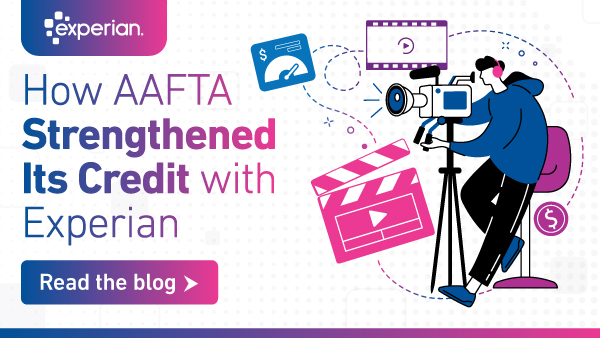
Real-life story of a leading vocational school in the entertainment industry building strong credit with Experian.

Did you know your small business has its own credit score? Discover how easy it is to check it with Experian. Just visit https://experian.com/smallbusiness, type your business name, and access your credit profile. Choose from a one-time report or a subscription for ongoing updates. Stay prepared and avoid surprises when applying for funding. Check your business credit today! Check Your Business Credit Score
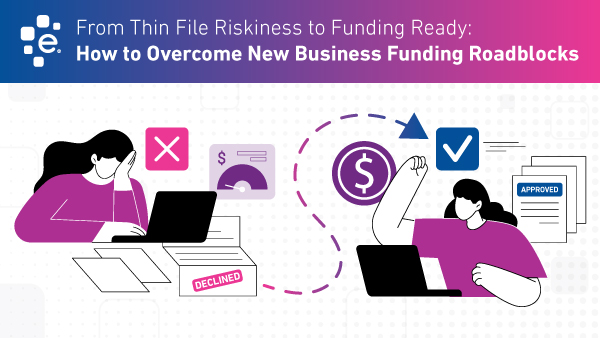
This post goes in-depth on going from no business credit to being ready for funding through good business credit practices.

Business owner Everett Neely shares his business credit journey with Experian for his DC renovation business.
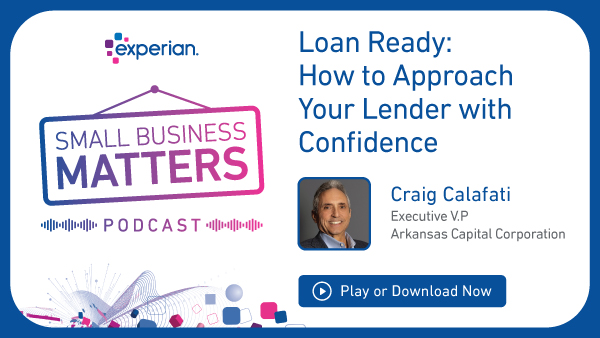
Business finance leader Craig Calafati shares how to be prepared when seeking financing In this episode of Small Business Matters, we tackle one of the most crucial steps for any small business owner: preparing to approach a lender for financing. With over 19 million new businesses formed in the last two years, accessing capital has become a common challenge for many entrepreneurs. However, many small business owners are simply not prepared when they step into a lender’s office. Whether it's underestimating their capital needs, being unsure about the necessary documents, or misunderstanding how the lending process works, these gaps can prevent them from securing the funding they need to succeed. Watch our interview We invited on a great expert who knows the ins and outs of small business lending like few others: Craig Calafati. He is the Vice President of Arkansas Capital Corporation (soon to be rebranded as ACC), and he brings over 30 years of experience in commercial lending—including 25 years as an SBA lender to the conversation. Craig has helped countless businesses navigate the financing process. In this episode, he offers invaluable advice on what every small business owner needs to know before they approach a lender. We discuss the common pitfalls entrepreneurs face, how to prepare your business for financing, and how to position yourself for success when speaking with a lender. Whether you're a startup, an established business looking to expand, or somewhere in between, this episode is packed with actionable advice. Topics Covered: Understanding Your Financial Needs: Why knowing the exact amount of capital you need is critical, and how to determine it accurately before applying for a loan. Real Estate Decisions: The pros and cons of leasing versus owning property, and why leasing may be a smarter option for many new businesses. The Importance of a Business Plan: How having a well-researched, detailed business plan can make or break your chances of securing financing. SBA Loans Explained: The role of the U.S. Small Business Administration (SBA) as a guarantor rather than a direct lender, and how to work with an SBA lending partner to secure financing. Building Relationships: The value of seeking advice from seasoned business owners or mentors to help guide your financing strategy. Managing Risk in High-Risk Industries: How Arkansas Capital Corporation successfully navigates lending to startups and industries like hospitality that traditional banks often avoid. Understanding Your Credit: Why it’s important to check both your personal and business credit before applying for a loan, and how lenders use this information. This episode is packed with practical insights and tips that will help you approach your lender with confidence, ensuring that you’re fully prepared to secure the financing your business needs to grow and succeed. What follows is a lightly edited transcription of our interview: Gary Stockton: Over the past two years, an incredible 19 million new small businesses have been formed in the U. S., marking a historic surge in entrepreneurship across the country. And while this is an exciting time for innovation and growth, it also brings a significant challenge, access to capital. For many of these new businesses, securing the right financing is essential to getting off the ground, expanding, and creating, or simply maintaining operations beyond the first few years. But here's the rub. Many small business owners are not fully prepared when they approach a lender. Whether it's not knowing how much money they need, misunderstanding their requirements, or being unsure of what documents to provide. And these gaps can be a major roadblock in securing the funding necessary for success. Today we're going to break down what every small business owner needs to know before applying for financing. We've brought a great expert who knows the ins and outs of small business lending like few others. Craig Calafati is Vice President of Arkansas Capital Corporation. He has over 30 years of experience in commercial lending, including 25 years as an SBA lender.He's helped countless businesses navigate the complexities of securing financing. And today he's here to empower you with lender-side insights, Craig, welcome to the Small Business Matters podcast. Craig Calafati: Thank you very much, Gary. It's a pleasure to be here. Gary Stockton: We're very, pleased to have you on. So let's get into it, you have extensive experience in commercial lending, particularly in building successful SBA programs. How did your background as a former small business owner shape your approach to lending? Craig Calafati: I think it gave me empathy if nothing else. I think I have a better understanding than a lot of lenders on what the day to day life is of a small business owner. So, these lenders will say, hey, let's set up a meeting for one o'clock and we'll all get together and, business owner's going, man, I gotta work during the day. And so I do have empathy for that. I know what it's like to try and run a small business and be doing other things on the side, trying to get things together for a loan. And it could be, a challenge. So I think that empathy has helped me out a great deal. Gary Stockton: And you've been with Arkansas capital corporation for about four years now. What motivated you to transition from a traditional banking environment to non-banker lender focused on undisturbed communities? Craig Calafati: I half jokingly say I'm paying my penance for being a banker for 30 years. Arkansas capital approached me and we probably talked for about eight months before I finally decided to come down here and I actually moved to Arkansas for this position. And it was the opportunity to do some good. I had been running large programs, nationally, top 10 nationally ranked programs up to this point up to that point and just the opportunity to go talk to borrowers again I was used to only talking to the CEO and answering to a board of directors. I actually get to go and talk to borrowers now to help people. We concentrate on helping underserved communities, and rural communities and it's just fun it's fun to help people and to see that end result, which I'd been removed from for so many years. Gary Stockton: That's fantastic. And Arkansas Capital Corporation recently obtained a SBLC license from the SBA, making you one of only three organizations to receive this in 40 years. Can you explain what this license entails and how it enhances your ability to serve small businesses nationwide? Craig Calafati: Sure, the SBLC license is a small business lending company and it's, a license that's granted by the SBA to non bank lenders, and, there are four, there were 14 up until, the beginning of this year. They allowed three more new licensees. And as you said that first time in 40 years, they had allowed new ones. and what it does is it allows a non bank lender to lend nationwide as opposed to just their state up, up to this point, Arkansas Capital we've been around since 1957, but we've been, as far as small business lending goes, relegated to just Arkansas and, some of the surrounding communities. This allows us to go nationwide. So what we're doing with that is, obviously we're ramping up. We're doing a slow rolled out. Right now we're operating in the surrounding states and pretty much across the southern united states. We'll take it. We'll take it nationwide when we feel we have our all our ducks in a row and the entire infrastructure set up, but for right now, we're going to concentrate on just the south. And, but that's what the SBLC license allows us to do. It puts us under the, regulation of the SBA. And, right now we're regulated by the state of Arkansas. Gary Stockton: There's often confusion around SBA loans with some entrepreneurs mistakenly believing that the SBA provides direct loans. Can you talk a little bit about the role of the SBA as a guarantor and explain the process of working with an SBA lending partner? Craig Calafati: Yeah, absolutely. There's a huge misconception that, the SBA is another government entity just throwing money out all over the place. That's not the case at all. The SBA is set up. The SBA has been a remarkable resource for small businesses over the years, and what they do is they provide the lenders with a guarantee. So and what i'm talking about now specifically is the 7a program, which is what most people are familiar with The SBA provides a guarantee of that loan for say on a larger loan, 75 percent of that loan amount when the bank goes and makes the loan, they know that if there's a problem and the loan defaults, after all the settlement's done and the collateral is sold and everything else, there is still a guarantee there from the U. S. Government for 75 percent of that original loan amount or the remaining actually of the remaining outstanding balance will be covered by the, U. S. government. And so what that allows is the bank, when there is a shortfall, say in collateral, or the bank can't quite get comfortable with it, they can look to that guarantee and say, okay, maybe that makes it better. And that allows the bank to go forward and make those loans. That's the hope anyway. Gary Stockton: That's great. And ACC specializes in areas that traditional banks often shy away from like startups and hospitality. What makes your approach to these high risk industries successful and how do you manage the risks involved? Craig Calafati: I think we take our time underwriting each individual deal. We look at every one of them. It's not a matter of checking boxes with us. For instance, we have everything that we do, our, application, our document uploads, everything you need to do the loan. We do online. It's, we have a full online application and, all that. And a lot of banks and mortgage lenders will do this too. They have a set. Minimum credit score that they have, it's usually around 680, maybe even as high as 700. And if you're below that, boom, it kicks you out. That's the end of the story. We have our set incredibly low far. It's 600 actually is where we have a set because I want to look at that individual deal. You might have somebody who has a really terrible credit score, but that's because three years ago, their spouse had cancer and they had all kinds of medical bills that were unexpected and they couldn't pay him right away and they were sent to collections. It has no bearing on the character of the person has no bearing on whether or not they pay their business bills or anything else. It's an extraordinary circumstance and they should be heard. And so that's one of the big differences with us is we take that time. We look at each deal individually and we trust our underwriters. If the underwriters come in and they say, look, yeah, we have these certain hiccups, but these are the mitigations. This is what makes us comfortable with it. Then we go forward on that. And, we specialize, as I said earlier, on underserved communities, people of color, rural areas, that kind of thing. Banks typically don't, they shy away from that, sort of lending. We like startups too. We, do a ton of startups. But, again, we underwrite the people and we underwrite the business and we don't go for just check boxes and how does this look and how does this compare to everybody else? We take each one on an individual basis. Gary Stockton: That's great. Let's, pivot to preparing for financing. One of the first things, that you advise is for business owners to know exactly how much money they need to get started.Why is it so important to have a clear understanding of your financial needs before approaching a lender? And how can entrepreneurs accurately determine this amount? Craig Calafati: It varies by what it is they're trying to do. If they're trying to refinance something, that's one thing. If they're trying to buy a building, that's another they're trying to buy a business another too. But you would be amazed how many people come into the office and they sit down in front of me and I say, okay, how can I help you? And they, I want to do this, how much money can I get? And I have no idea because I don't know your business. What I'm looking to you for, especially those initial conversations is how much understanding do you have of your business? Do you know? You should know exactly how much money you need. Know what equipment you need, what you're going to need to operate, how much you'll need for advertising and all the other ancillary expenses, you should have a very good understanding of how much you need. That's going to tell me that you've done the research, that you know your business. And that for me is, everything. that's what I want to see. Gary Stockton: Yes. And you touched when we were talking previously, can, you talk and elaborate on exactly what a business owner should bring to the meeting with their lender? What is the lender most interested in? Craig Calafati: Again, depending on what they're trying to do, if they're starting a business, we want to see a business plan. And that kind of goes back to the earlier question. We as lenders, any of us, we want to know that you understand your business and what it's going to entail to not only start that business, but get it up to speed and maintain it long term. And we want to see that you've done that research, that you have a very good understanding of how it's going to operate, because how can you impart it to us and make us understand it if you don't understand it? We know a lot about a lot of different businesses, but we don't know any, we don't know anything about your particular business, so it's really important that they bring that with them. You're going to be asked for a number of different things, tax returns, tax returns, background stuff, credit information, all that, but that business plan and the projections and everything else that tells us what you want to do and what your understanding is. And it's also something that's going to follow that loan through the process. So it's going to go to the underwriter. The underwriter is going to read it, say, Oh, okay, this is what they want to do. And this is how they're going to do it. And so that document is very important in the beginning. Gary Stockton: How about, checking their own business credit report before asking for financing? Craig Calafati: Absolutely. your personal and your business, because they both enter into it. It's not just, people need to understand that too. Their personal credit is every much as important as their business credit. Some companies don't even really have much business credit just because they're they're very small and they're flying under the radar. And, so, naturally, everybody kind of gloms onto your personal credit and, fair or unfair, that's just the way it is. And they look to that to judge the character and everything else. But you should definitely have a good understanding. It's like going to buy a car. Hopefully, when you go to buy a car, when they walk back in the office after you've negotiated, you're not totally surprised by what they say about your credit. You have a pretty good idea. Yeah, I pay my bills. It's, I have a good credit. Yeah. I would have an understanding about all that. Gary Stockton: Listening to other, interviews you've given, you've mentioned that new business owners don't necessarily need to own real estate right away, and that leasing can be a viable option. Can you elaborate on why leasing may be a better choice? Craig Calafati: For a myriad of reasons. First and foremost, if you're going, if you're going to buy the real estate up front, you need that much more money. At minimum, you're going to need probably 10 percent to put down and a lot of banks are going to ask for a lot more than that. So, because it's tying up cash that you're desperately going to need in the beginning. Lease that building. You may, your business may morph over the first year or two, and you may find certain aspects that you thought were going to be very important to the business are not and something else became very important. And now your location doesn't work as well as you thought it was going to now you're stuck in the thing because you own the building. It's a lot different than trying to get out of a lease and moving to another facility that works better. They're just a lot of different reasons, but particularly in the startup hold on to your capital that's the key. It's typically on a startup, we look for and this is an anomaly in the business. Most banks want to see 20-25 percent investment by the borrower in a startup business. We're looking for 10 percent typically, we want you to hold onto your money. We, know that some kid's gonna ride by and break your picture window the second week you're open and you're going to need a thousand dollars to fix that window. You don't want to close down because you couldn't fix a window. So, hold on to your cash. And I, think that's very important. And it's, there are very few businesses that have to buy their property. Most businesses can get by with a lease property for, in the beginning in particular. Gary Stockton: Yeah, that's good advice. You encourage entrepreneurs to reach out to others who have experience in running a business. How can connecting with seasoned business owners or mentors help in financing? And, what should entrepreneurs look for in these relationships? Craig Calafati: It can help in, several different ways. Just the fact, talking to somebody who's been through it. They might help you avoid some of the pitfalls. They can also advise you on their experiences with financing. Maybe what they should prepare for ahead of time. How their lender worked and whether or not they were happy with them or not, we, I, we survive and thrive on our customers talking about us. That's the best advertising I can get. yeah, I would always talk to, what was their experience in borrowing the money? Good and bad. Would they advise going to where they went? That kind of thing. But just in general, talking about the businesses, I mentioned, how your business might morph in the beginning that you didn't know. We talked about me being in a small business and I was in the restaurant business. When we initially opened, we were a full service italian restaurant. Over the years, we morphed into pizza because that's where the money was. And that's what sold. And, the, first location did not resemble the second and third location. I can tell you that. And so, that's where I'm coming from, and a lot of that was just experience and, I imparted that to anybody who would listen when they'd come and talk to me, I would tell them the pitfalls and, the certain things that I learned the hard way, and you can avoid a lot, of costly mistakes. Gary Stockton: Yeah, and I can see how your direct experience as a restaurateur brings value to your current role as an executive on the finance side, because you bring a certain empathy to those, conversations, what it's like, to be maybe in the early startup phase or in, the struggling phase. Right Now, you mentioned the importance of micro lending, particularly for businesses that feel it's hopeless to apply for a loan. Can you talk about the challenges these businesses face and how microlending can provide a solution? Craig Calafati: Yeah, microlending is interesting. we're, starting a microlending program right now. And it's, very interesting because, and what it is, to be very frank about it, banks don't want to do little loans. It's not costly. We are going into microlending knowing that we're not going to make money at it. it's strictly mission based for us. We believe in it. And we happen to be fortunate enough, we make money in other things that we do because we're a non-profit and I'm not a bank, so I don't have other people giving us money to lend out, but we've got to raise that money. Gary Stockton: Let's talk a little bit about the pandemic and how it forced many businesses in the restaurant and hospitality sectors to innovate quickly. You know, from your perspective, what lasting changes. Have you seen in these industries and how should new businesses adapt? Craig Calafati: One of the biggest things that we saw was so many things going online, with, ordering and contactless pickup and that, that sort of thing. I think it trained a lot of people to start doing things online to not show up at a restaurant for as an example, show up at a restaurant to order to go, and then wait there to pick it up and that kind of thing. So a lot of these places they adapted they created you know, ways to do takeout ways to do delivery that didn't exist before they had to do them to survive. And so you're seeing a lot of that and but the people adapted it too And in a lot of ways they decided hey, we like that a lot better. You can see in the banking businesses is a great example. They were starting to downsize ahead of time, but the pandemic really showed a lot of people that. I don't have to go to a branch bank anymore. I can do all that stuff online. And, and so now you're starting to see a lot of banks, not so much in Arkansas, but in other states, they're closing down branches. They're learning from it and other businesses adapt as have adapted the same way. Gary Stockton: Yeah. I like the change. I do. I've become very accustomed to, Sweet Greens is a great brand. I'm not sure if you have them down there in Arkansas, but they've got the full digital experience, pick up the food. You can eat it in some locations, but they've got that nailed in, terms of, making it just easy for the customer to just go in, grab, or even have it delivered and the delivery services as well. I do lean on those because, you get time back in your day in a lot of cases. And, then if you want to go out and be social with people, you still get into restaurants. So, I think it's an exciting change. And I think we're seeing some of that, bleed into other industries too, so it's, really cool. And now we've got AI, we didn't have AI during the pandemic. Now AI is really powering a lot more. The new phones from Apple are real exciting. you're going to have Apple Intelligence built into them. So I can imagine this. Craig Calafati: Ordering my iPhone 16 gets here in a little bit. So I can take advantage of that. Hey, one thing I did want to bring up, and this is a, this is something that I think is, apropos to this conversation and something that changed with the pandemic and is still last a long lasting effect and new businesses in particular need to think about this. When you're doing your business plan, labor is a big problem right now, particularly in when you're looking for minimum wage or, that, that strata. So if you're opening a restaurant, if you're opening a retail establishment, anything where you're requiring people on the floor, lower paid people, they're difficult to find now. And I ask people all the time, they bring me, I keep going back to restaurants, but it's a good example. I look at their business plan and they have between, lunch service and dinner service and seven days a week, they have 30 to 40 employees they got to hire. Where are they going to come from? You start talking to small business owners out there, they are struggling. They're cutting back hours. They're doing a number of different things because they can't find the people. So that's something really to think about when you are doing your business plan, or you're thinking about expansion or anything else is the labor pool isn't what it used to be. And you need to really think about that. Gary Stockton: Yeah. Yeah, definitely. So when we talked earlier, you hinted at a name shift for Arkansas Capital Corporation, moving toward the ACC brand. Can you share a little bit more about that and the reason behind the shift and what it means for the future growth of your company? Craig Calafati: Sure. I think it's just in keeping with, the, with Arkansas Capital's mission and what we plan on doing as we go nationwide, ACC seemed to make more sense as a name than Arkansas Capitol, just because people would automatically think we were located, we are located in Arkansas and we're proud of it, but that we only served Arkansas. And so we think ACC is just a better, way to go about it. We'll, start rolling that out the next few months. I think it'll just better identify what we really do. and so you'll, see that in the next few months. Gary Stockton: And that's a, good opportunity to expand into those, underserved communities and small businesses that haven't had access to, capital. So that's, exciting, Craig. Craig Calafati: Yeah. and, we've talked about this earlier, I touched on it briefly, but the thing with, a micro lending with, banks, they don't want to do, they don't want to do the small loans because they just don't make sense financially for them. They take a lot of time to do. The banks also don't really typically like rural settings. If they end up with properties, they have to sell, they can sit for a long time and shareholders don't like that. Shareholders don't like it when you have, businesses out in the middle of nowhere, or, it's mainly the small thing. it's, and it's not just the banks. A lot of banks want to do the smaller loans. The loan officers just don't want to mess with it. Let's face it. A lot of loan officers work off commissions and they have a choice of doing a $30,000 loan to help out a business get started or a $2 million loan to help a business buy a couple of trucks and a garage for it. They're going to do the, bigger one that they make more money off of. And it's, unfortunate, but it's just happens to be the way the business is set up. And so we're, excited about getting into micro lending. We think we can do a lot in that space. There are a lot of people clamoring for it. It's getting through to people and convincing them, hey, I will actually listen to you and I am interested in helping you. I'm not going through the motions here. I'm not going to bleed you of all your information and then say, sorry. It's not for us. We're, serious about this and it's part of our mission and we believe it. Gary Stockton: Well, Craig, this has been so helpful. I got a lot out of that. Can you let our audience know how best to get in touch with you to start a conversation? Craig Calafati: Actually, the best thing to do is go to arcapital.com, it's Arkansas Capital's website. And there you can not only find all our contact information, but our application's online. You could apply right then and there if you'd like. And it's all automated. You'll go through, you'll fill out everything. Then there's a next page. It'll tell you what documents you need. And it's very straightforward. There's always somebody you can contact if you need help. And we're, that's what we're here for. I really appreciate it. Thank you very much, Gary. Gary Stockton: Craig Calafati, with Arkansas Capital Corporation, soon to be ACC. Thanks very much for coming on Small Business Matters.
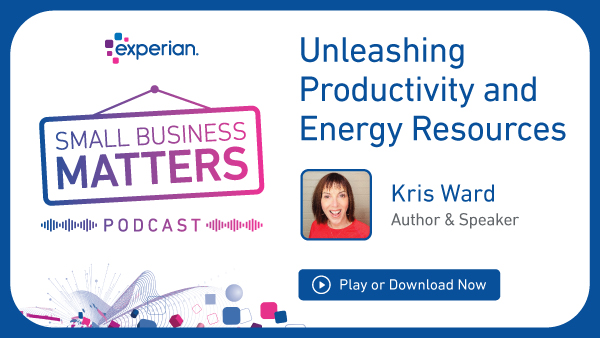
Discover Kris Ward’s revolutionary productivity strategies on The Small Business Matters podcast to transform your business and beat burnout.



